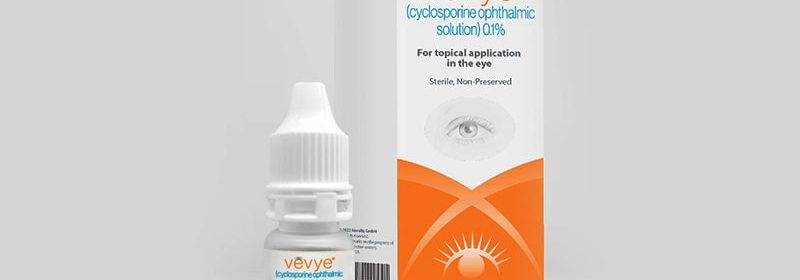FDA Approves Second Waterless Solution for Dry Eye Disease

The US Food and Drug Administration (FDA) has approved the first waterless cyclosporine-based solution for treating the signs and symptoms of dry eye disease, according to manufacturer Novaliq GmbH.
The treatment, Vevye, (topical cyclosporine ophthalmic solution, also formerly known as CyclASol) 0.1%, is a calcineurin inhibitor immunosuppressant. The water-free and nonpreserved solution contains cyclosporine 0.1%, as well as perfluorobutylpentane and ethanol.
The solution is administered twice daily in each eye, 12 hours apart, according to the FDA’s prescribing information.
The approval was based results from three multicenter, randomized clinical studies, NCT02617667, NCT03292809 and NCT04523129, which enrolled a total of 1369 participants with dry eye disease.
The first, a phase two trial published in the journal Ophthalmology in January 2019, enrolled 207 patients with a history of dry eye disease.
Patients receiving the cyclosporine solution had a significant reduction in total corneal fluorescein staining (tCFS) from baseline compared with placebo and another cyclosporine product (Restasis): at week 4, −1.88 ± 2.046 for cyclosporine 0.1% and −0.85±2.476 for Restasis; at week 12, −2.18 ± 2.378 for cyclosporine 0.1% and −1.17 ± 2.603 for Restasis.
The second trial, a phase 2b/3 study, published in 2021 in the journal Cornea, found that treatment with cyclosporine 0.1% improved tCFS from baseline at week 4 (-0.8, P = .0002), compared with placebo.
The third trial, a phase 3 study published in JAMA Ophthalmology in April, found patients receiving cyclosporine experienced a larger improvement in tCFS from baseline (-4.0 grade reduction) compared with the placebo group (-3.6 grade reduction) at day 29.
In the phase 2 and phase 3 trials, patients had a statistically significant increase from the baseline in Schirmer’s wetting. In the phase 2 trial, 8% of participants who received Vevye had at least a 10 mm increase in tear production compared with the placebo group (P = .04). In the phase 3 trial, 11% of the Vevye group experienced the increase, compared with 7% of the placebo group (P = 0.05).
The most common adverse effects were site reactions and temporary decreases in visual acuity, according to Novaliq. The treatment has not been adequately tested in pregnant women, according to the FDA.
The approval comes just a few weeks after the FDA approval of Miebo, a water-free perfluorohexyloctane-based solution indicated to treat the excess tear evaporation associated with dry eye disease. Miebo was also developed by Novaliq GmbH and its partner Bausch + Lomb.
Dry eye disease is a common disorder that develops when a person produces an inadequate amount of tears to keep the eye lubricated.
Novaliq also intends to seek approval for Vevye from the European Union, and is conducting clinical trials in China, according to their website.
The clinical trials were funded by Novaliq.
For more news, follow Medscape on Facebook, Twitter, Instagram, YouTube, and LinkedIn
Source: Read Full Article